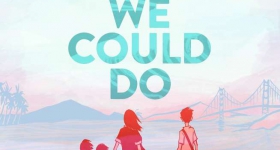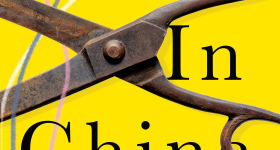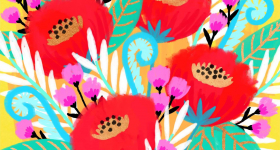An excerpt from The Woo-Woo: How I Survived Ice Hockey, Drug Raids, Demons, and My Crazy Chinese Family by Lindsay Wong. Published by Arsenal Pulp Press, 2018. All rights reserved.
Chinese Hell Month
Because she feared starving so much, my mother shopped three days a week at Costco, which meant that we hoarded food, and that eating was almost as essential as money. In our family, a large gift of cash was better than love, but a platinum credit card showed genuine affection. Food, however, was real currency. It was a symbol of our family’s unusual makeup. In the Hong Kong slum of my mother’s childhood, you could sell a whole person for enough rice to last one or two months (depending on how much you liked your children).
“Couldn’t you just sell, like, parts of someone?” I asked my mother one day, several months after she had recovered from our all-night drive to Starbucks by sleeping three days straight. I was genuinely curious, and after being marooned with my mother in the car, I think part of me knew I could lose her. And I was getting bolder, more willing to say the craziest shit, even if it was cruel, to hold her attention. “I mean, what if you only wanted enough rice for two weeks? Like, couldn’t you offer up one of your sister’s legs, and then next week sell another sister’s arm?”
“Oh my fucking God,” my mother declared, sighing. “You really are retarded.”
“No, seriously,” I said, eyeing my sister and wondering how many pounds of rice she was worth and whether trading her in would earn me more time with my mother, who was clearly overwhelmed by three kids. Why did my mother have to be so traditional and have my brother? Why couldn’t she just stop with me? Also, did the exchange go by the pound? And how did each party decide what was fair? Some children were bigger boned than others.
This collective obsession with starving meant that our basement, known as the food room, was basically a makeshift earthquake shelter or a post-apocalyptic zombie survival room for all your end-of-the-world needs. Shelves stocked with every type of pasta. Wheat crackers in obnoxious cardboard towers. Plastic bins became vending machines, spewing out every species of granola bar and rice noodle — fresh and stale — maniacally stockpiled together. I am not kidding when I say that we might buy six family-sized tubs of salsa, and then in the following weeks, my mother would desperately buy another three or four more.
“It’s for emergencies,” she insisted whenever I sniped at her for hoarding groceries. “See that shovel? We’ll dig out the freezer and find water and frozen waffles.”
If western North America did not plummet into the murky Pacific and we did not drown first, if the Belcarra did not topple backwards down the mountain in a mudslide, and if we survived all the terrible afterquakes, the autopsy reports would show that a family of five found shelter but were poisoned by trying to survive on spoiled goods. A nationwide warning would be issued: Update your emergency rations. Look at what happened to those Wongs — they never checked the expiry date. Hadn’t the idiots heard of botulism?
But every August was Chinese Hell Month, also known by Buddhist monks as the Hungry Ghost Festival, which only fuelled my mother’s neurotic worry about ghosts and starvation. Chinese Hell Month proved that my family couldn’t escape the judgment of our ancestors, who came rushing to our house for an overextended visit, so we were supposed to leave out packaged food for our hungry ghosts. Fortunately, we had a year-round food room with countless varieties, which meant we could supposedly please all our dead visitors from last year to the Tang dynasty. In our family, it was believed that those who had abundant food had tremendous wealth and power. Food could make anyone, including monsters, grateful and happy, so if we fed the ghosts, we could prevent possessions and unnatural deaths.
***
Unfortunately, it was just before Hell Month when news of Gung-Gung’s dying spread, and it was thought that all the hungry ghosts leaving hell were responsible. My grandfather was a long-time sufferer of Parkinson’s disease, and the aunties believed his death was long overdue. Besides, they said, he was paralyzed from the waist down and strapped to a wheelchair, so what else could he possibly do? The best solution, the family had agreed, was to find a convenient date for everyone so that he could kick the bucket.
“He’s a bad man,” my mother explained to my siblings and me, always furious whenever someone mentioned him. “So it’s going to take him many tries to die, not peaceful. He lived in the gambling house and he lost all of our money and brought home other women to laugh at Poh-Poh. So now it really sucks to be him.”
Before his mind went fuzzy, Gung-Gung used to say he didn’t “give a shit” about Poh-Poh and pretended that she didn’t exist.
Over the years, the convulsions in Gung-Gung’s limbs had worsened as his muscles gradually atrophied. It began when he would accidentally catapult his chopsticks across the room. He could be sipping tea or sawing steak, and his miniature Chinese teacup or knife would suddenly spring forward to twirl mockingly on the linoleum floor. “Watch out!” he had to learn to holler in English as his muscles suddenly went berserk and his arms spasmed and pitched whatever utensil he was holding.
In his semi-functional years, as he slumped in his wheelchair, Grandpa became a robot timed to sporadically assassinate his family — he could really turn on you. Then one day his muscles finally stopped quivering, though his feet, which were stuffed into fat woolly ski socks, still shuddered like quaky continents banging into one other: thuck, thuck thuck. But it still looked like he was going to sideways punt you. Sometimes Gung-Gung’s fingers would tremble like they were trying to pounce in a tremulous staccato on the piano or, depending on your point of view, like he very much wanted to claw out an eye or two. It was always an interesting and dangerous experience to be in the same room as him.
Despite Parkinson’s disease and myriad other genetic afflictions, mental illness was our family’s inborn cancer — we would eventually learn that we could not run away from ourselves.
***
A few days before Chinese Hell Month, I got “possessed.” My mother was sure it was because we hadn’t left the ghosts enough food, even though they couldn’t really eat and it was supposed to be a symbolic gesture. Also, because I constantly ridiculed her about rituals, and she seemed frightened that she couldn’t make me her capable conspirator against her spirits anymore. By now, my siblings and father had stopped speaking to her, responding only with savvy silence or a spare “Shut up.” Because my siblings and I took her illness personally, not understanding it, we followed our father’s example and took any opportunity to dismiss her. Retribution, no matter how petty, I felt at 16, was real power. This also meant that if our mother forfeited the terms of our acquaintanceship, she’d be completely ostracized in our home, her ranting attributed to just another moaning ghost.
It had been much too hot to stay indoors, and my siblings wanted cheeseburgers, no more steamed fish on rice, which was what we had most nights. We drove the five minutes to a local restaurant on the mountain, and my mother and I gulped down Bellinis to celebrate the upcoming Chinese Halloween/Chinese Hell Month. Beer-drinking age in our household was nine, because my parents had been raised in flea-infested villages in Hong Kong, where homemade rice alcohol was often safer to drink than well water. But this was my first Bellini, which I thought tasted like toilet cleaner and fruit punch. Family dinner in public, rare, and usually only on Chinese holidays to save money, was always strange, since we really did not know how to communicate civilly. This was quickly done, lest any of us should admit to having fun. No one spoke, and the purpose of dining together in public seemed to be a competition of whoever could be the quietest and quickest eater. Really, we had nothing to say to one another.
Later that evening, my father decided to splurge on movie tickets (we went to the movies once a year for blockbuster action films), and while we were standing in line to purchase our tickets at the Poteau’s only movie theatre, “the ghosts got me” and suddenly I was struck blind. Blood emptied from my head as if I had been flipped upside down, and my vision flickered in and out. The room spun. I staggered to the right and bumped into walls and rammed into a life-sized cardboard cut-out of Shrek. I mowed down a few more movie characters.
I heard my mother screaming, “She’s possessed! Help! Help! Ohmygod, help!”
It happened so quickly that there was no time to be scared. No time to be afraid of the Woo-Woo ghosts, no time to realize that I was no longer in possession of my seizing body. Zombielike, I was staggering around in the dark with my arms in front of me. I could hear people shouting, and swiftly, I was toppling over and smacking my head on the carpet of the lobby. My muscles slackened, and there was piss pouring down my legs and soaking my denim skirt a darker hue. People were shouting even louder, and everything went tarry black.
Then I was abruptly waking up on the ground. The theatre manager had arranged maybe 20 standing movie posters — an impressive circus ring — to hide my unintended solo act. It was supposed to give me some privacy, but now I was on display. Most people on Pot Mountain went to the theatre on Friday, since there was nothing else to do, and they were all crowding and staring. I recognized the neighbours and a few kids I disliked, who snapped pictures of me with their cellphones. I was the Poteau’s opening entertainment before they watched Hollywood blockbusters on the big screen. Slumped in a contortionist’s pose, my left arm snagged behind my back, my entire body was freakishly paralyzed. As if my limbs were anaesthetized.
“Don’t move,” the manager instructed me urgently. “You’ve been unconscious for six minutes. The ambulance is on its way.”
This made me a little angry that I had been reduced to a cinematic preview. At 16, I thought I might really be dying, but I didn’t feel too bad about it. Dying seemed temporary and brief, like getting a booster shot for measles, or even getting punched in the face. Besides, if I died now, I wouldn’t have to write college entrance exams in senior year. If I died now, I would not have to worry about Chinese Hell Month and would find out if my ancestors would welcome a semi-skeptic and half-believer. Mostly, I think, as a teenager, I felt that death was not permanent or final, as I’d return as a ghost with abundant powers. Wasn’t my family always going on about the power of the undead?
The theatre manager was still arranging the silver movie poster stands at least a foot apart, so people could still see me.
“Stop doing that,” I slurred at him. Even dying and dizzy, I was still abrasive, a result of my father’s lifelong lesson to never reveal any weakness. I was also humiliated that strangers had seen me in such a weakened state. “Hey, put the posters closer together. You’re doing it all wrong.”
I was still soaking in my pond of pee — it seemed like an hour, but it had only been 25 minutes. And then I blacked out again, and the paramedics took a blood sample, pricking my index finger with what looked like a dagger or a thermometer. My stomach churned and cramped. The older, kinder female paramedic rushed me to the bathroom because I insisted I needed to go, but it was much too late and I shat myself. The paramedics, who were incredibly slow-moving in real life, strapped me onto a stretcher and someone propped the movie theatre doors open. I was so groggy I did not care anymore. My mother was jogging enthusiastically beside the lurching stretcher, asking me how many ghosts were housed inside me and if possession hurt at all. She spoke in rapid besieged Cantonese, so the paramedics could not understand. I did not need an interrogation right now, but she was not the kind to ask how you were feeling.
“What’s it like being possessed?” my mother yelled again, as the stretcher bounced up and down a few movie theatre entrance steps. The trip to the ambulance was uncomfortable and dawdling; luckily, I was not an emergency, because the paramedics had parked underground and couldn’t remember where their vehicle was. They argued for a bit, while I tried to move my legs without a lot of luck.
“Am I talking to Lindsay or a ghost?” my mother persisted, looking fascinated. “I’m Lindsay’s mommy. Hello! Hello?”
Reprinted with permission from The Woo-Woo: How I Survived Ice Hockey, Drug Raids, Demons, and My Crazy Chinese Family by Lindsay Wong (Arsenal Pulp Press, 2018).










Comments